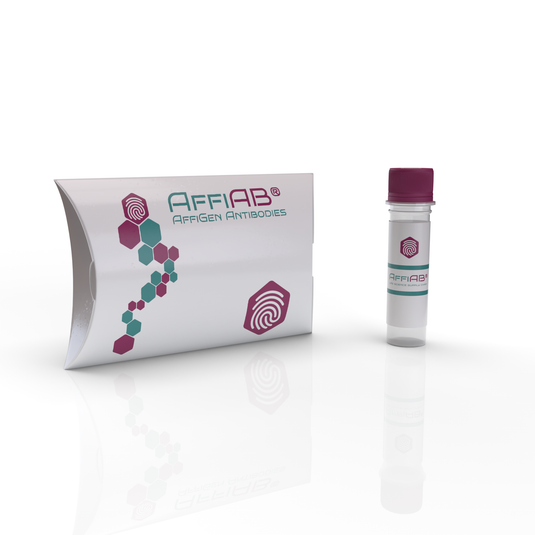AffiAB® Goat Anti-Rab27 Polyclonal IgG Antibody
AffiAB® Goat Anti-Rab27 Polyclonal IgG Antibody is a reliable and accurate antibody for research use. It is highly specific for Rab27 protein and offers consistent results for immunochemistry, immunoprecipitation, and western blotting. The antibody's superior performance is backed by rigorous testing and manufacturing standards, ensuring reliable results every time.
Host: Goat
Species: Mouse
Description:
The AffiAB® Goat Anti-Rab27 Polyclonal IgG Antibody is an antibody designed to specifically recognize and bind to the Rab27 protein. Rab27 is a member of the Rab family of small GTPases, which play important roles in regulating vesicle trafficking, exocytosis, and secretion in cells.
This polyclonal antibody is generated by immunizing goats with purified Rab27 protein or a specific peptide sequence derived from Rab27. The resulting antibodies are then purified from goat serum to ensure high specificity and quality.
The AffiAB® Goat Anti-Rab27 Polyclonal IgG Antibody is commonly used in research applications to study the expression, localization, and function of Rab27 in various biological processes. By detecting and visualizing Rab27, researchers can gain insights into its involvement in vesicle transport, regulated secretion, and cell signaling.
Researchers typically employ techniques such as immunoblotting, immunofluorescence, immunohistochemistry, and immunoprecipitation with this antibody. These techniques enable the analysis of Rab27 protein expression, subcellular localization, and interactions with other molecules or cellular components.
It's important to note that the AffiAB® Goat Anti-Rab27 Polyclonal IgG Antibody specifically targets Rab27 and may not cross-react with other Rab proteins or related molecules. Researchers should validate the antibody's performance and specificity in their specific experimental conditions by performing appropriate controls and assays.
In summary, the AffiAB® Goat Anti-Rab27 Polyclonal IgG Antibody is a valuable tool for investigating the expression, localization, and function of Rab27 in various cellular processes. By specifically detecting Rab27, researchers can gain insights into its roles in vesicle trafficking, exocytosis, and secretion, contributing to our understanding of intracellular mechanisms and cellular physiology.
Gene Identifier/Accession Number: ENSG00000069974
Form: N/A
Concentration: 2.5 mg/mL
Type: Primary
Clonality: Polyclonal
Isotype: IgG
Conjugation: Unconjugated
Application: Western Blot, Immunofluorescence, Immunohistochemistry PARAFFIN PROTOCOL , Immunohistochemistry FROZEN.
Storage: For continuous use, store at 2-8 °C for one-two days. For extended storage, store in -20 °C freezer. Working dilution samples should be discarded if not used within 12 hours.
Special instructions: The antibody solution should be gently mixed before use.
Goat Anti-Rab27 Polyclonal IgG Antibody
In the realm of biomedical research, antibodies are indispensable tools used for the detection, quantification, and functional study of proteins. The Goat Anti-Rab11 Polyclonal IgG Antibody has emerged as a significant player in this arena, particularly in the study of intracellular trafficking and protein sorting mechanisms. This article delves into the properties, applications, and significance of this antibody in scientific research.
Background:
Rab11 is a member of the Rab GTPase family, known for its pivotal role in the regulation of endosomal trafficking. This protein is involved in various crucial processes including recycling of plasma membrane proteins and lipids, translocation of transport vesicles, and cytokinesis. Due to its fundamental role in cellular processes, Rab11 has been a subject of interest in studies related to cancer, neurodegenerative diseases, and other conditions.
Properties of Goat Anti-Rab11 Polyclonal IgG Antibody:
Source and Production:
This antibody is produced in goats, utilizing Rab11 protein or a specific Rab11 peptide as an antigen. The use of goats as a host species offers advantages in terms of large-scale antibody production and a diverse immune response.
Specificity and Sensitivity:
Being polyclonal, this antibody is a mixture of immunoglobulin molecules that target multiple epitopes on the Rab11 protein. This characteristic enhances its sensitivity and ability to detect various forms of the protein, including post-translationally modified variants.
Purity and Validation:
The antibody is typically purified through affinity chromatography, ensuring high specificity. It undergoes rigorous validation processes, including Western blotting, immunofluorescence, and immunohistochemistry, to confirm its specificity and reactivity.
Applications in Research:
Cell Biology Studies:
The Goat Anti-Rab11 Polyclonal IgG Antibody is extensively used in studying intracellular transport and recycling endosome dynamics. Its application in immunofluorescence and confocal microscopy allows researchers to visualize the distribution and movement of Rab11 in cells.
Challenges and Considerations:
While the Goat Anti-Rab11 Polyclonal IgG Antibody is a powerful tool, it is crucial to consider factors like batch-to-batch variability and cross-reactivity. Researchers must ensure proper controls and validation for each experiment. Additionally, the ethical sourcing of antibodies from goats is an important consideration in line with ethical guidelines and animal welfare standards.
Conclusion:
The Goat Anti-Rab11 Polyclonal IgG Antibody represents a vital tool in the exploration of cellular mechanisms and disease pathology. Its applications extend across various domains of biomedical research, offering insights into cell biology, disease mechanisms, and potential therapeutic targets. As research continues to evolve, the use of such specific and sensitive antibodies will remain integral to advancements in the life sciences.

